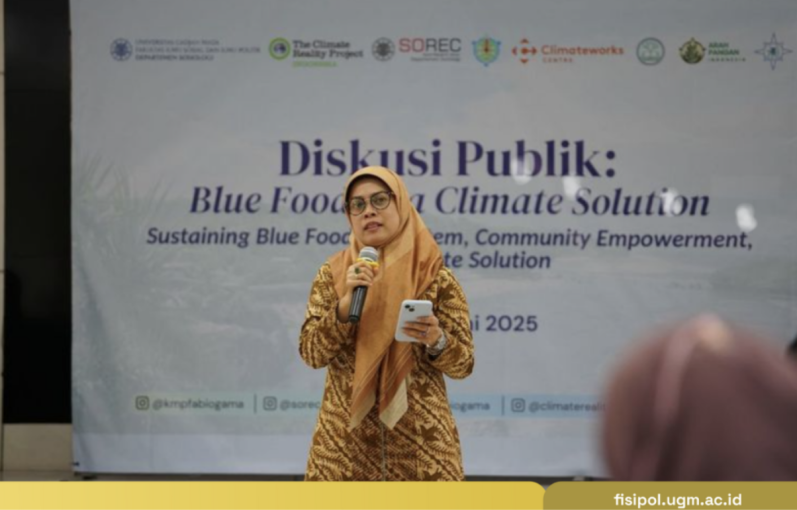
Yogyakarta, June 4th 2025 – Indonesia with its natural wealth has biological resource potential that has not been fully maximized. As an archipelago, the marine sector has long been one of the export commodities that support the country’s economy. However, on the other hand, the level of fish consumption and the welfare of fishermen have not been evenly distributed. The Faculty of Social and Political Sciences (Fisipol) of Universitas Gadjah Mada presented the discussion “Blue Food as Climate Session: Sustaining Blue Food Ecosystem, Community Empowerment, and Climate Solution” on Wednesday (4/6).
Delivered by Prof. Luky Adrianto, Ph.D, Head of the International Maritime, Marine and Fisheries Research Institute (i-MAR), Institut Pertanian Bogor (IPB), the blue economy has become a long-term perspective of economic transformation. The issue that needs to be considered is not only about the diversity of nutrients in aquatic food sources, but also how to form a blue economy that is equitable and able to prosper the community. Not to mention environmental issues such as climate change and marine pollution that also threaten underwater life. According to him, there are many aspects that must be considered to develop a competitive blue economy.
“Blue food must be inclusive, and must not abandon aspects of justice in production. Of course, this requires collaboration between sectors,” Luky said. He explained that the blue economy will not be separated from the food chain or aquatic food resources. Judging from the upstream to downstream process, there are various problems that make the system not yet improved, such as stagnant production and uncertain policies. The current government has an agenda to establish food security as an indicator of the nation’s progress, but until now, food insecurity is still high.
In some areas, fish consumption levels still tend to be low. Even coastal communities as the main producers of the blue economy have not received equal welfare. This was explained by a civil servant of the Maritime Village Activist of the Special Region of Yogyakarta, Bahari Susilo, S.Pi., M.S.E. that fish consumption in households in Gunung Kidul area alone only reached 19.12 kg in 2024. This number decreased compared to the previous year, which was around 19.38 kg. Whereas fish is a food source that has high nutrition and can be a means of alleviating malnutrition problems such as stunting.
The difficulty in accessing fish food can be caused by problematic supply and consumption chains at several points. For example, fishermen as fish producers are unable to consume their own catches because they have to be sold. Likewise, when they are in the market, the prices of seafood tend to be expensive, making the household sector not prioritize seafood as a daily food. “Fish is rich in micronutrients, there needs to be education about various types of fish with high nutrition, not necessarily expensive. Mackerel, for example, has a higher omega level than salmon. This needs to be socialized,” said Bahari.
Looking at policies in Yogyakarta, the vision and mission of the Governor of Yogyakarta from year to year has included a focus on the development of southern coastal communities. The vision includes improving the welfare of coastal communities, cultural development, and information technology. Unfortunately, in practice it is still not implemented, especially in the marine resource empowerment sector. The prioritized tourism sector has actually caused damage and potential threats to marine life.
A unique perspective was presented by Fina Itriyati, the Vice Dean of Faculty of Social and Political Sciences of UGM for Research, Community Service, Cooperation, and Alumni. According to her, the role of women in the blue economy sector is very important. In the production part, men play a role in the process, but to make fish present as household food, women play a major role. “In coastal communities, it is also the mothers who help a lot in the production process. So this inter-gender role needs to be supported so that they can support each other,” said Fina.
The blue economy discussion presented various perspectives, ranging from seafood nutrition, distribution chains, to the role of gender in the ecosystem of coastal communities. The hope is that this discussion can inspire multi-sector initiatives to support the development of the blue economy. This event also supports the 14th Sustainable Development Goal on Marine Ecosystems.
